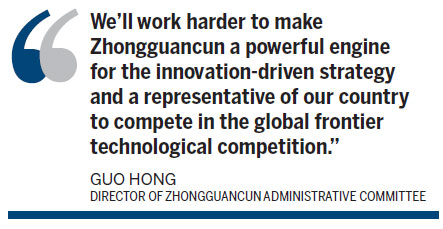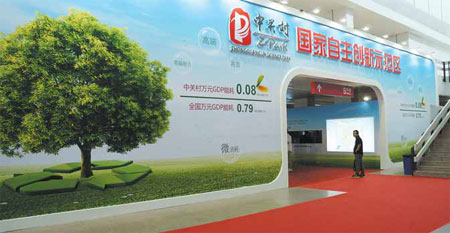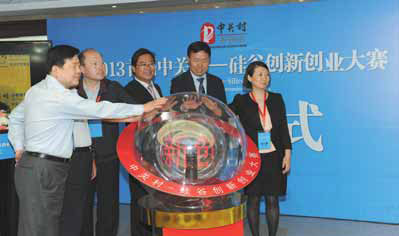US expert: Makes software on par with Silicon Valley
The high-tech business hub Zhongguancun in Beijing aspires to be a truly global center of technological innovation by 2020, said Guo Hong, director of its administrative committee.
Dubbed China's Silicon Valley, the area has made breakthroughs in core technologies in a wide range of sectors.
Its innovations include the latest in mobile telecommunications, high-end integrated circuit equipment, user terminals for the Beidou navigation satellite system, an H1N1 influenza vaccine and communication-based train controls.
Hundreds of technological solutions have been sourced from Zhongguancun for major national projects including the Beijing Olympic Games, the Shanghai World Expo, manned space flights and the lunar exploration program.
"Zhongguancun is an outgrowth of China's reforms and opening-up," Guo said.

Beginning as a street where electronics goods were sold in the 1980s, the area has grown into a national demonstration zone for proprietary innovation, the first of its kind in the country.
It has expanded from 233 square kilometers to 488 sq km, more than 70 percent of Beijing's total industrial land.
Now it's home to nearly 1,900 companies that each generated 100 million yuan ($16.3 million) in revenue last year, with 342 of them reaching 1 billion yuan in turnover. Forty-five companies surpassed the benchmark of 10 billion yuan.
Overseas investors are a dynamic force behind the boom. Government data shows there were 1,671 foreign-funded companies in 2012 that had 781 billion yuan in combined revenue.
Some 248 overseas-invested research institutes with a combined staff of 293,000 technicians and scientists spent a total of 10.45 billion yuan on R&D last year.
At the same time, multinationals have accelerated building research facilities in the zone. The operations include China Intel's joint labs and the fourth-largest R&D center worldwide for pharmaceutical and chemical company Merck Serono.
High-tech startups
The rich research resources and innovation-friendly atmosphere have made Zhongguancun a magnet for tech-driven startups.
The zone registered more than 3,000 new tech firms annually in recent years, according to the administrative committee.
Chinese entrepreneurs with overseas study or work experience play an active role. To date, they have founded more than 600 companies, making Zhongguancun the most investment-intensive area on the Chinese mainland for returning overseas Chinese.
On an average day, two startups by returning overseas Chinese are founded, according to the administrative committee.
Burgeoning demand for the startups has drawn an influx of venture capital to the zone including overseas fund companies such as Sequoia Capital, International Data Group and Tiger Fund.
About one-third of China's venture capital investment and projects are in Zhongguancun, local officials said.
Stock exchanges from New York, Hong Kong and Germany have signed agreements with the administrative committee to help local companies go public.
By the end of last year, 79 companies had become publicly traded in overseas markets, about 35 percent of the listed companies in Zhongguancun.
Technology Review, a magazine published by the Massachusetts Institute of Technology, reported that cities across the world are competing to duplicate Silicon Valley's prowess at startups and multibillion-dollar technology companies. But only Beijing has emerged as a serious contender.
"I've seen startup clusters all over the world," Steve Blank, an entrepreneur and business school professor who recently visited Beijing, told the magazine.
"But Beijing blew me way. They've built an ecosystem on a scale that puts Boston or Seattle to shame. Beijing compressed 30 years of startup learning into five years."
"Think of what Rome looked like in the time of the empire or New York in the 1920s - now it's Beijing announcing that China has arrived," Blank posted on his own website in mid-April.
"What made the overwhelming impression on me was finding an entrepreneurial software cluster on par with the Internet software portion of Silicon Valley," he wrote. "The physical heart of Beijing startups is in Zhongguancun."
Going global
Zhongguancun companies are also moving up the value chain.
They filed more than 1,700 international applications through Patent Cooperation Treaty, accounting for 64.2 percent of Beijing's total and 12.8 percent of total PCT filings by domestic companies across the country.
Technology contracts worth nearly 246 billion yuan were signed last year, enabling tech licensing or transfer from Beijing companies.
The value grew by 30 percent over 2011 and accounted for 38 percent of the country's total.
With a stronger technological muscle, Zhongguancun companies have exported tech solutions to more than 50 countries and regions including the US and Japan, and set up some 300 branches abroad.
To further integrate itself in the international community, the zone has forged long-term partnerships with more than 10 foreign peers including Sophia Antipolis in France and the Ottawa Center for Research and Innovation in Canada.
A member of the International Association of Science Parks, Zhongguancun has submitted a bid to host the 2015 IASP annual congress.
As well, it is increasing efforts to build the annual Zhongguancun Forum into a global brand for meetings on innovation and economics.
Inspection
Zhongguancun has long been valued highly by the country's policymakers. The Politburo selected it as a classroom at the end of September for their latest "collective learning" on implementation of innovation-driven development.
Top leaders inspected local companies, learned about their growth and had discussions on the challenges they face.
The arrangement is a great encouragement to all Zhongguancun people, Guo said, adding that in 25 years of development the zone has become a source of technology policies and emerging strategic industries.
With an improved policy atmosphere and a more friendly entrepreneurial ecosystem in the zone, local companies now compete to set new records, he noted.
Domestic PC leader Lenovo spent 15 years to reach 10 billion yuan in sales. Search engine Baidu took 12 years to pass that threshold. Yet newcomer Xiaomi, a maker of smartphones, has done it in less than three years.
The first 100 companies in the zone realized their dream of going public after 20 years of effort, while the latest group of 100 took less than four years to become listed.
Beijing Party chief Guo Jinlong called on the zone to play a leading role in the national innovation-driven development strategy.
Zone Director Guo responded by saying "we'll work harder to make Zhongguancun a powerful engine for the innovation-driven strategy and a representative of our country to compete in the global frontier technological competition".
"It is what's required by the situation and also a pressing national mission."
zhuanti@chinadaily.com.cn
|

Zhongguancun showcases its achievements and vision at an international high-tech expo in Beijing. Photos Provided to China Daily
|
|

Launch ceremony for a startup contest in the national high-tech zone.
|
(China Daily 10/10/2013 page24)








